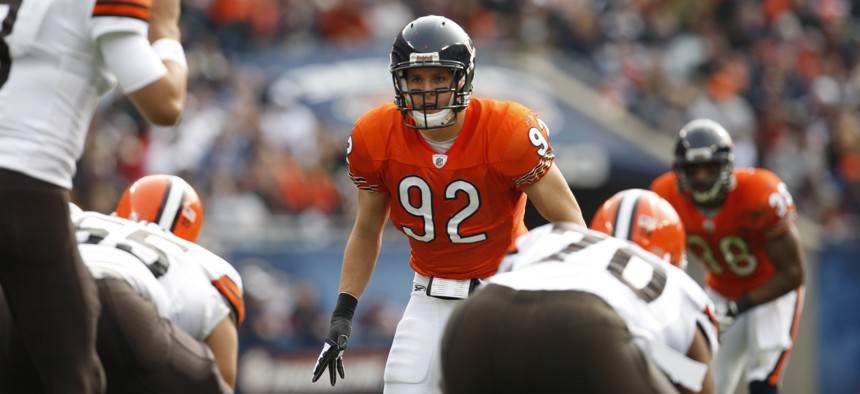Cleveland’s ‘Jock Tax’ Faces Big Setback in Court

Chicago Bears linebacker Hunter Hillenmeyer (92) is seen in action against the Cleveland Browns during an NFL football game in Chicago, Sunday, Nov. 1, 2009. Nam Y. Huh / AP Photo
The way Ohio’s second-largest city taxes out-of-town athletes sparked a lawsuit by two former NFL players.
In a ruling handed down Thursday, the Ohio Supreme Court declared that the way the city of Cleveland’s collects its “jock” tax on out-of-town professional athletes is unconstitutional but rejected arguments that the controversial tax should be scrapped in its entirety.
As the Northeast Ohio Media Group reports, the ruling could cost Ohio’s second-largest city at least $1 million in jock tax revenue annually.
The basis of the lawsuit, filed by two former NFL players, hinges on Cleveland’s method of assessing its a 2 percent local income tax on visiting athletes based on the total number of games played in the city and dividing it by the total number of games in the season.
The plaintiffs, Hunter Hillenmeyer and Jeff Saturday, argued that the city should factor in the total number of annual work days, which include job duties like practices and team meetings, with number of games played in the city.
“Due process requires an allocation that reasonably associates the amount of compensation taxed with work the taxpayer performed within the city,” Justice Judith Ann Lanzinger wrote in in a unanimous decision. “By using the games-played method, Cleveland has reached extraterritorially, beyond its power to tax. Cleveland’s power to tax reaches only that portion of a nonresident’s compensation that was earned by work performed in Cleveland. The games-played method reaches income for work that was performed outside of Cleveland, and thus Cleveland’s income tax violates due process as applied to NFL players such as Hillenmeyer.”
According to Northeast Ohio Media Group:
Of the eight U.S. cities that have a jock tax – Cincinnati, Cleveland, Columbus, Detroit, Kansas City, Philadelphia, Pittsburgh, and St. Louis – only Cleveland has been using a "games-played" formula.
Cleveland argued that the "games-played" method is fair because NFL athletes are paid for one thing: to play in games. Attorneys for Cleveland also argued that the city has the power to make its own decisions about how to charge taxes, as long as its policies are reasonable.
Beyond those eight cities, many state governments assess their own jock taxes. As Stateline, an initiative of the Pew Charitable Trusts, reported last October:
All but nine states have income taxes, but as Stateline reported [in 2013], some of them have exemptions for short-term visits. States and cities that do levy the jock tax calculate it in one of two ways. Most states count “duty days,” or the total number of days an athlete works for the team, including games, practices, team meetings and other team-related activities. Then the state calculates the number of days the athlete engaged in those activities in that state, calculates the percentage of the athlete’s income earned there, and taxes that amount at the state’s rate for high income earners (the bracket into which most professional athletes fall).

NEXT STORY: Peoria’s ‘Budget Challenge’ Puts Residents in the Driver’s Seat






